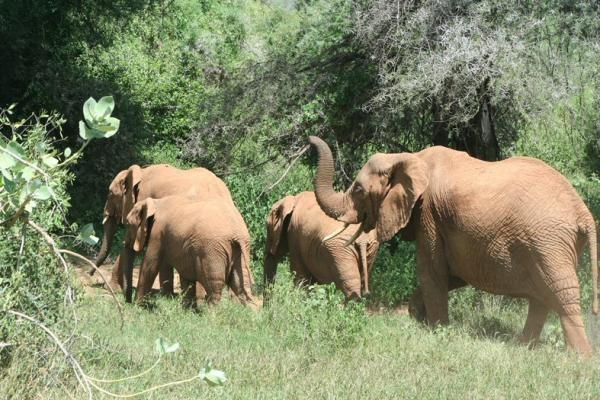Researchers are learning how to say, ‘Run! Bees!’ — in elephant
Elephants running from bee sounds, making the “bee rumble” as they move.
The African elephant, the largest land animal on Earth, is terrified of bees.
Joseph Soltis, a research scientist at Disney’s Animal Kingdom in Lake Buena Vista, Florida, says elephants make a specific alarm call to alert the other members of the herd to the danger. Even more interesting, this call — a low rumbling vocalization — is distinct from an alarm call elephants use to warn the herd of human danger.
Soltis was part of a team of researchers from Oxford University, Save the Elephants and Disney’s Animal Kingdom that conducted audio experiments on elephants in Kenya.
In the first part of the experiment, the researchers played the elephants the sound of bees or human voices, noting the differences in the elephants’ reactions and recording the “alarm call” the elephants made.
“When we play the bee sounds to them,” Soltis says, “the elephants run away, and they shake their heads and flap their ears around — to try, I assume, to knock the bees away from the face area. Their reaction to the human sound is different.”
The elephants run from the human sounds, too, Soltis says, but there is none of the head shaking. Instead, the elephants will often turn and look back, standing vigilantly and scanning the area to see if any humans produce themselves.
In the second part of the experiment, the researchers played the elephants’ recorded alarm calls back to them. In each case, their reactions to the “bee alarm call” and the “human alarm call” were the same as before, and clearly distinct from one another.
Soltis says researchers analyzed the elephant rumbles in the lab and heard detailed acoustic differences between the two alarm calls that occur at frequencies too low to be distinguished by the human ear. Both alarm calls use rumbles, but the rumbles are different.
“Here's the intriguing thing,” he says. “The difference between the bee alarm call and the human alarm call is just like a vowel change in human language. Imagine the words ‘boo’ and ‘bee.’ They mean different things because of the vowel sound. That change is affected by how we manipulate our tongue and our lips and other parts of our mouths."
The shape of our lips when we say, ‘boo’ makes the vocal tract a little longer and produces a slightly deeper sound, Soltis point out; with the word “bee,” we have a wider, open mouth. These small differences change the “resonant frequencies” of the vocal tract. The same kind of change is noticeable in the elephant sounds, Soltis says. “The shift in these resonant frequencies — the vowel shift, if you will — distinguishes the bee alarm call from the human alarm call.”
Some researchers are using these discoveries to help farmers and elephants more easily co-exist on the African plains.
“One of the big problems for elephants everywhere,” Soltis says, “is that there are people around, and there are farmers. Elephants are herbivores, so they come right onto the farms, and whatever they don't eat they trample on.”
These are local farmers who are just growing food for their families, Soltis says, not “agribusiness.” These farmers have to protect their livelihoods. “So conservationists are always try to think of clever ways to stop elephants from entering farms,” Soltis says. “That's a tall order, because they’re big fellows.”
Lucy King, a researcher with Save the Elephants, has helped develop a creative solution. Soltis says, “[King] thought maybe they could fashion some kind of beehive fence to protect farms — a living fence, as a natural deterrent for crop-raiding elephants.”
The farmers built a number of artificial hives and strung them together with wire, far apart, surrounding a local farm. When the elephants come to the farm at night, they hit the wire, causing the beehives to shake. The angry bees come out of the hives, the elephants smell them or hear them, and they stay away. “It's amazing,” says Soltis. “Even I was surprised how effective it was.”
King did additional research, Soltis says, in which she compared beehive-fenced farms to unfenced farms, and found that elephant families avoided the fenced farms.
Now, Soltis says he and other researchers are trying to spread the word. “We want everyone to use beehive fences where it's appropriate," he says. "We have a new research site in southern Kenya, where there are a lot more farmers and the same situation: a new population of elephants near an unfenced farm who come out and crop-raid. We want to find out if those elephants are afraid of bees, too.”
This story is based on an interview by our partner Science Friday, a weekly radio show and website covering science, technology and other cool stuff.
